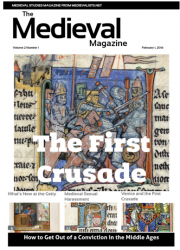The First Crusade: Pope Urban II and Jerusalem vs. Diplomatic Unification
Alexandra Wurglics
Pope
Urban II preaching the First Crusade in the presence of Philip I before
the assembly. An illustration from the Grand Chronicle of France,
illuminated by Jean Fouquet, Tours, c. 1455-1460
Once he witnessed the enthusiasm of the Crusaders, Pope Urban II realized that the goals of the Crusade, specifically the reconquest of Jerusalem, could be achieved. Historians posit that as a result of this positive reception, the papacy developed additional goals for the Crusade including the stabilization and unification of diplomatic relations between the Eastern and Western Churches in order to make the Church a stronger force in the East. Some historians, such as Carl Erdmann and Hans Mayer, view Pope Urban’s actions preceding the First Crusade as justification for this broader goal of unification, while others, such as H. E. J. Cowdrey and Johnathan Riley-Smith, argue that Urban’s speeches addressed the reconquest of Jerusalem as the Crusade’s main objective. Whatever his motives, Pope Urban II’s background, position as pope, and persuasive speeches created a climate of enthusiasm which helped persuade the Crusaders to take back Jerusalem.
Pope Urban II’s experiences and the events leading up to the official beginning of the First Crusade helped shape the motives and overall goals set by the papacy. Papal control was challenged during the 1080s when Archbishop Wibert of Ravenna named himself Pope Clement III (1080-1100) and challenged the Gregorian papacy. With two active popes, the Church’s power was compromised, and maintaining control was difficult. Pope Gregory VII (1073-1085) was forced into exile to Salerno, Italy. Clement remained the anti-pope during Urban II’s entire reign, and he occupied Rome during the majority of Urban’s pontificate. Urban, however, often traveled outside of Italy in order to secure his relationships with churches and communities. In this way, he kept connected to many areas across Europe and helped create stability and control for the Church and the papacy.

